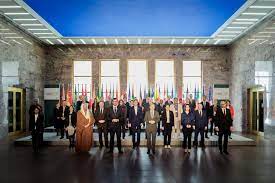
The Petersberg Climate Dialogue, a forum for high-level international climate talks held annually before the United Nations Climate Change Conferences (COP), took place in Berlin, Germany from May 2-3, 2023. Germany and the United Arab Emirates hosted this year's conference, which coincided with the 28th Conference of Parties (COP28) to the United Nations Framework Convention on Climate Change (UNFCCC). Delegates from more than 30 countries and international organisations attended the summit, including the United Nations Secretary-General, the President of COP28, and the German Foreign Minister.
| Article and Schedule Quiz | Start Test! |
Need for Clean Energy Transition:
The conference highlighted the need for a clean energy transition to limit global warming to 1.5°C, the target set out in the Paris Agreement. The UN Secretary-General emphasized the need to “break our fossil fuel addiction and drive decarbonization in every sector” to achieve this target. The participants recognized the need to transition from fossil fuels to renewable energy sources to achieve net-zero emissions by 2050.
Global Renewables Target:
The German Foreign Minister initiated discussions around a potential global target for renewables at the next climate conference. He emphasised the importance of making significant reductions in greenhouse gas emissions in order to reduce global warming to 1.5°C. The participants discussed the potential of renewable energy to address climate change and agreed to work towards a global renewables target.
Fossil Fuel Phaseout:
The COP28 President called for a tripling of renewable energy capacity by 2030 followed by a doubling in 2040. He urged participants to ramp up renewable energy capacity building and focus on phasing out fossil fuel emissions while phasing up viable, affordable zero-carbon alternatives.
Status of Climate Finance:
The conference discussed the status of climate finance and the need to mobilize funding for climate action. The developed countries are "on track" to fulfil the USD 100 billion per year pledged during COP15 in 2009 to mobilise by 2020. However, a recent estimate pegs climate finance needs at 1 trillion USD annually by 2030 for emerging markets alone, highlighting the urgent need for financial reparations. The participants emphasized the need for developed countries to fulfill their financial commitments to support climate action in developing countries.
Urgent Global Financial Systems Transformation:
The participants underlined the need for an urgent global financial systems transformation to unlock crucial climate finance for the most climate vulnerable countries in the world. The cost of preventing global temperatures from going above 1.5°C cannot fall on the poorest countries, who are least responsible for the atmospheric store of greenhouse gases. The participants emphasized the need for a just and equitable transition to a low-carbon economy.
Global Stocktake:
The year 2023 is the year for the Global Stocktake, which aims to assess whether current efforts will enable us to reach the objectives set out in the Paris Agreement. The report has been underway for the past two years and is set to be released in September of 2023. The participants discussed the importance of the first Global Stocktake in providing an opportunity to evaluate progress towards achieving the Paris Agreement’s goals.